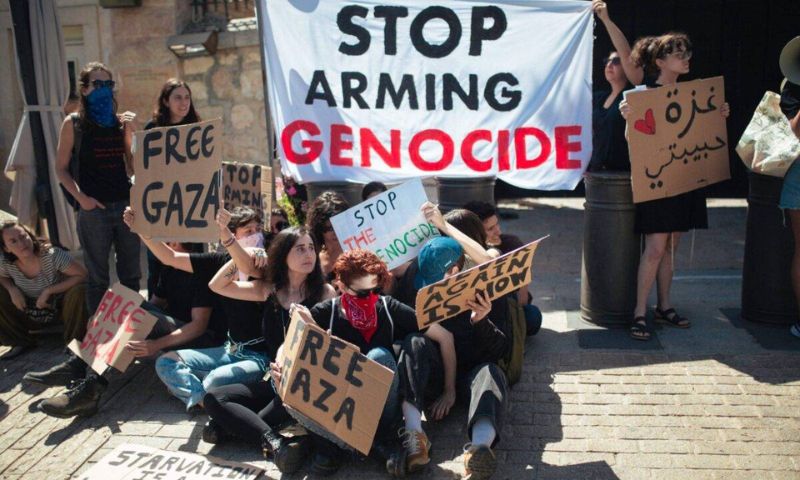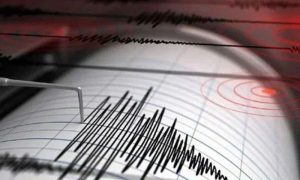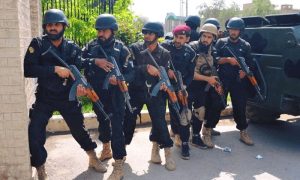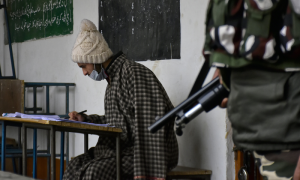WASHINGTON: Tens of thousands of activists in the United States have launched an appeal urging Congress to stop military aid to Israel, amid growing concerns about the impact of arms supplies on the ongoing conflict in Gaza.
The appeal, which has gathered around 134,000 signatures out of the targeted 204,000, calls for a suspension of arms deliveries to the Israeli military to prevent further casualties among Palestinian civilians.
The petition highlights the escalating violence in Gaza, intensified by recent developments in the region. Regional tension further escalated following the assassination of Hamas leader Ismail Haniyeh, blamed on Israeli intelligence agencies, although Israel has not formally claimed responsibility.
Israeli military has killed at least 39,500 Palestinians, mostly women and children, in the besieged Gaza Strip since October 7, the Health Ministry in Gaza reported on Saturday.
The health ministry reported that more than 91,280 people have been injured in the ongoing Israeli bombardment campaign since October last year.
In response to the fears of a wider Middle East war, the United States warships and fighter jets are headed to the Middle East to help defend Israel, the US closest ally, in case Iran responds militarily to the assassination of Hamas’ top political leader Ismail Haniyeh in Tehran.
The Pentagon announced that it is deploying the USS Abraham Lincoln aircraft carrier strike group to the Middle East, accompanied by additional naval cruisers and destroyers equipped with advanced ballistic missile defence systems. This deployment aims to enhance the defence capabilities of Israel and to prepare for potential retaliatory actions by Iran and its allies.
In a statement, the Pentagon said Defence Secretary Lloyd Austin also ordered additional ballistic missile defence-capable cruisers and destroyers to the European and Middle East regions and is taking steps to send more land-based ballistic missile defence weapons there.
The Pentagon did not say when the various ships and aircraft will be in place, but in a statement Friday it described the moves as necessary to “mitigate the possibility of regional escalation by Iran or Iran’s partners.”
The statement also said the movement of more military capabilities to the region aims “to improve US force protection, to increase support for the defence of Israel, and to ensure the United States is prepared to respond to various contingencies.”
The new orders came just hours after Austin pledged additional support to Israel during a call with Israeli Defence Minister Yoav Gallant.
“The secretary reiterated ironclad support for Israel’s security and informed the minister of additional measures to include ongoing and future defensive force posture changes that the department will take to support the defence of Israel,” Pentagon spokesperson Sabrina Singh said during a briefing.
The strategic increase in military assets comes after a dramatic spike in regional violence. Earlier this week, an Israeli strike in Lebanon resulted in the death of Hezbollah’s top military commander, Fouad Shukur. This attack was followed by the assassination of Ismail Haniyeh, who was in Tehran for the inauguration of Iran’s new president. Haniyeh’s death has been attributed to Israeli intelligence, although Israel has not formally claimed responsibility.
Iran has reacted strongly to Haniyeh’s assassination, with Supreme Leader Ayatollah Ali Khamenei condemning Israel and vowing severe retaliation. “The criminal, terrorist Zionist regime martyred our dear guest in our territory and has caused our grief, but it has also prepared the ground for a severe punishment,” Khamenei posted on social media.
The Iranian government has signaled that it will coordinate a response with key allies, including Hamas, Hezbollah, Houthis, and various militias in the region.
Iranian officials said Thursday they planned to meet with representatives from Iran’s key allies — including Hamas, Hezbollah, Yemen’s Houthis, and militias in Iraq and Syria — to plan their next steps.























